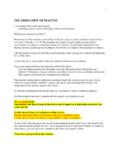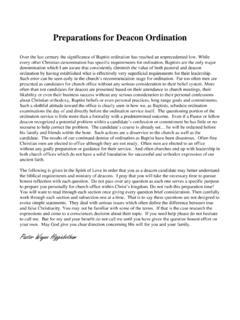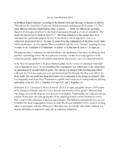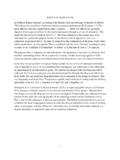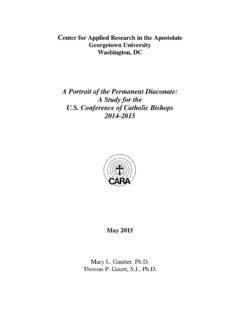Transcription of Guidelines for the Sacred Order of Deacons in the ...
1 Guidelines for the Sacred Order of Deacons in the Episcopal Diocese of Kansas 1I. Intent of These Guidelines These Guidelines are set forth to articulate a normative understanding of diaconal ministry ( , its form and function) in the Episcopal Diocese of Kansas. These norms pertain to those called to serve the Church as Deacons , and not those serving as transitional Deacons who are preparing for ordination to the Presbyterate. II. The Nature of the Diaconate The understanding of diaconal ministry set forth herein is grounded in three primary sources: the Holy Scriptures, The Book of Common Prayer (1979; hereafter BCP ), and the Constitution and Canons of the Episcopal Church.
2 Each of these sources bears witness to diaconal ministry as being characterized chiefly by service, both in the Church and in the world. As servant ministers, Deacons (and those who aspire to ordination to the Diaconate) should exemplify in their lives a spirit of service to others, including a dedication to helping others enter into the ministry of Christian service. Ordination to the diaconate is not the way we recognize or validate existing ministries; it is rather a means of forming ministers of the Gospel whose call it is to model the servant ministry of Christ to all the baptized. Deacons are not ordained to do outreach ministry on behalf of the Church, but to be an icon of prophetic servant ministry and to lead all members of the Church into servant ministry in the world.
3 Deacons also help interpret the needs and concerns of the world to the Church. Deacons will be ministers who have a visible ministry to the dispossessed, are willing to undertake prophetic ministry, and will strengthen the servant ministry of the Church in the Diocese. As is the case will all ordained ministers serving in the Episcopal Church, Deacons are required to resign from active service upon reaching 72 years of age; annual reappointment by the Bishop may occur on a case-by-case basis. 2 III. The Relationship of the Deacon to the Bishop Deacons are appointed to their respective ministries by the Bishop (see Canon ).
4 The Bishop may designate a Deacon to serve as a parochial Deacon, a diocesan Deacon, or an Archdeacon; it is expected that every Deacon will at all times strive to exercise the ministries and responsibilities particular to their Order (see section two, above). All Deacons are expected to enter into written agreements that detail the parameters of their specific service and ministry (see the Sample Letter and Ministry Agreement, Appendix A). Parochial Deacons are charged with serving a particular parish or mission; within that context, they work collaboratively with the other clergy serving that parish under the guidance and direction of the Rector, Vicar, or Priest-in-Charge.
5 Diocesan Deacons are charged with actualizing and developing Diocesan ministries and initiatives under the guidance and direction of the Bishop or other designated authority ( , Canon to the Ordinary, etc.). The Bishop may also, at his or her pleasure, appoint two diocesan Archdeacons, one to serve the two Convocations of the eastern half of the Diocese and one to serve the two Convocations of the western half of the Diocese. Archdeacons will provide oversight and pastoral care for Deacons , provide support and counsel to the Bishop, and assist the Bishop liturgically as needed as requested by the Bishop. Archdeacons will also perform annual ministry reviews of all active Deacons and report annually to the Bishop on the state of the diaconate within the Diocese.
6 While Deacons are always subject to reassignment to further the work of the Church, under no circumstances shall a Deacon resign or vacate an assignment without the prior approval of the Bishop. Deacons may serve as chaplains in prisons, hospitals, hospices, schools, and other institutions, provided they are trained and credentialed to do so. 3IV. The Relationship of the Deacon to the Parish Parochial Deacons serve in a particular parish under the guidance and direction of the Rector, Vicar, or Priest-in-Charge. Under canon law, a parochial Deacon is considered an Assistant Minister and, as such, must offer his or her resignation to the Bishop should the clergy charged with oversight of the parish resign the cure.
7 The Deacon may be reappointed by the Bishop to serve during the interim under the direction of the Bishop and the Senior Warden. When a new Rector, Vicar, or Priest-in-Charge is called, the Deacon may be reassigned to the parish or mission by the Bishop. Upon reassignment, the Deacon is encouraged to enter into a new written agreement with the parish or mission and the Bishop. All Deacons assigned to a parish shall enter into a Ministry Agreement (see Appendix A) with the parish and the Rector, Vicar, or Priest-in-Charge. This covenant must be approved by the Archdeacons and the Bishop and will provide the structure for an annual ministry review by the Archdeacons.
8 Ordinarily, every covenant will include provision for the following: annually, four weeks of vacation; annually, two weeks for continuing education and diaconal formation; as needed, any days needed for sickness or other debilitation; as needed, any time necessary to develop and maintain self-support outside the Church, with adequate advance notice; a three-month sabbatical leave every 5 to 7 years, contingent on the Bishop s approval. The Deacon s primary ministry within the context of a parish should be structured in a manner consistent with the understanding of diaconal ministry set forth above (see section two).
9 It is appropriate (though not necessary) for parishes to have a committee to work closely with the Deacon on outreach ministries. It is also appropriate (though not necessary) for the Deacon to be 4the almoner for the parish and to have a discretionary fund with which to render assistance to those in need. Disagreements between clergy open the possibility for scandal and division within the Body of Christ. In the event of irreconcilable differences between a Deacon and other clergy with whom the Deacon serves, conflicts should be quickly and discretely brought to the attention of the Archdeacons and the Bishop. Likewise, if problems arise that affect the welfare and unity of the parish, the Deacon shall bring them to the clergy charged with oversight of the parish and shall follow their advice and counsel.
10 V. The Ordination of Deacons Ordinarily, there should be one ordination of candidates to the diaconate per year, which will take place at Grace Cathedral under the direction of the Bishop. All Deacons are expected to attend all ordinations within the Diocese unless they receive a written excuse from the Bishop. All Deacons are given the opportunity to renew their ordination vows at the annual Chrism Mass during Holy Week, and are expected to participate in this liturgy. It is appropriate that a service be held to mark the beginning of a newly-ordained Deacon s ministry in the context where the Deacon has been assigned.

